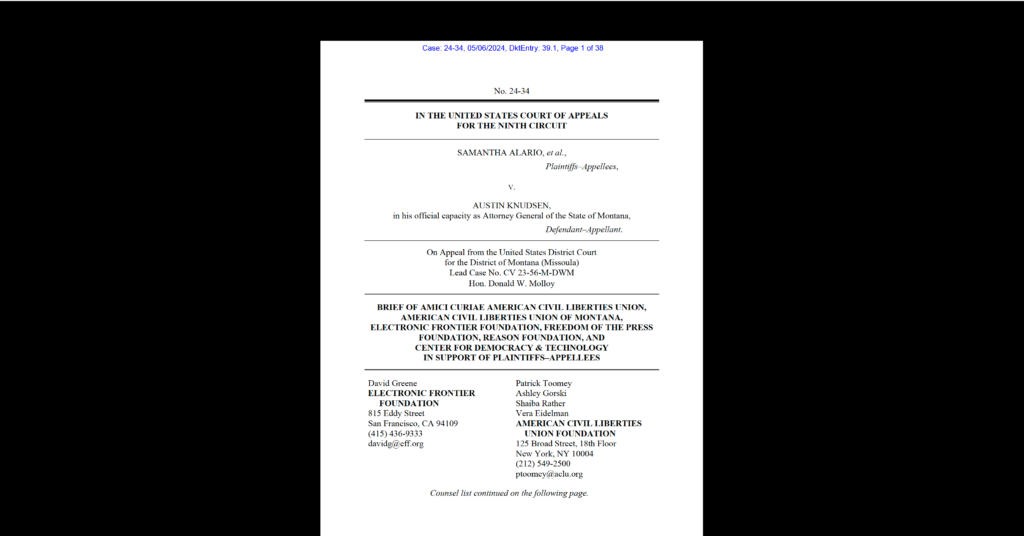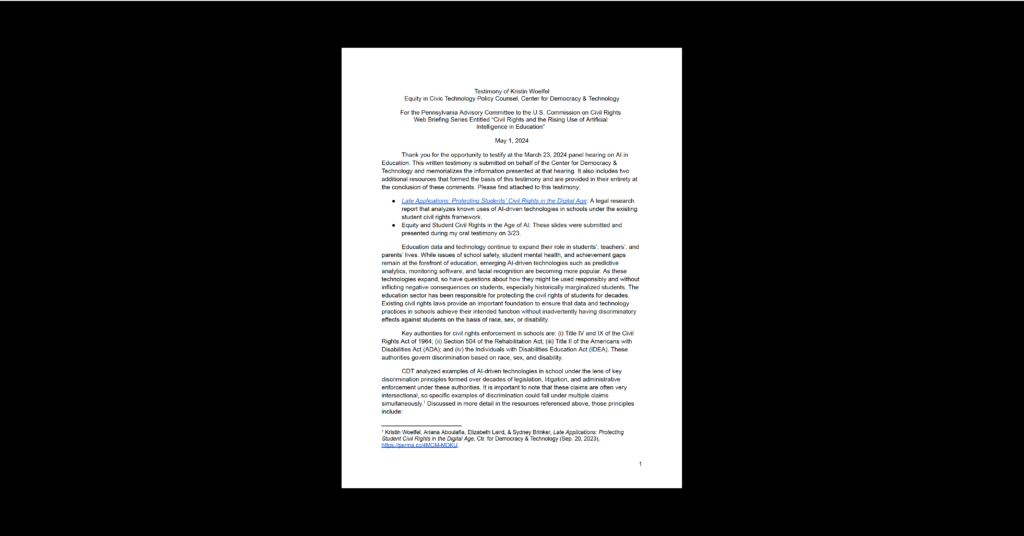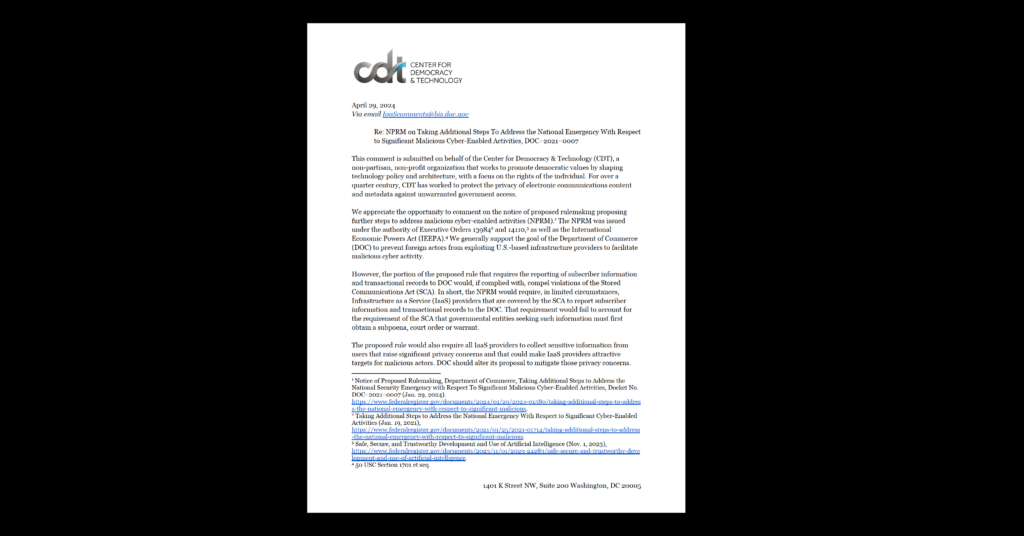AI Policy & Governance, European Policy, Free Expression, Government Surveillance, Privacy & Data
EU Tech Policy Brief: April 2021 Recap
This is the April 2021 recap issue of the Centre for Democracy & Technology Europe’s monthly Tech Policy Brief. It highlights some of the most pressing technology and internet policy issues under debate in Europe, the U.S., and internationally, and gives CDT’s perspective on them. Our aim is to help shape policies that advance our rights in a digital world. You can subscribe here.
Rights Advocates Mireille Hildebrandt and Morten Kjaerum Join CDT Europe Board of Directors
CDT Europe was excited to welcome two distinguished European scholars and human rights advocates to CDT’s Board of Directors: Mireille Hildebrandt and Morten Kjaerum. Hildebrandt is a professor at Vrije Universiteit Brussel and the Co-Director of the Law, Science, Technology, & Society Research Group. Her research focuses on the intersection of law and computer science in constitutional democracies, including on the implications of automated decisions, machine learning, and mindless artificial agency.
“CDT is dedicated to fundamental rights in a time of extraordinary challenges,” says Hildebrandt. “It has a long history of forcefully foregrounding how computational technologies impact the substance of freedom of information, non-discrimination and privacy. I hope to contribute to upholding and reinventing the checks and balances of the rule of law, ensuring that we do not put ‘the human in the loop’ but keep our ‘machines in the loop’.”
Kjaerum is the Director of the Sweden-based Raoul Wallenberg Institute of Human Rights and Humanitarian Law and the former Director of the EU’s Fundamental Rights Agency. For decades, he has been a champion of human rights.
“It’s a great honour and privilege to be able to serve on the board of CDT,” says Kjaerum. “CDT is one of the leading organisations addressing the most pertinent issues of the 21st century, namely, how we ensure that technology serves humankind. A human rights framework is a good starting point for this essential journey that I look forward to embarking upon together with an inspiring group of board members and a fantastic staff.”
Hildebrandt and Kjaerum join existing CDT Europe Board members Alan Davidson, Senior Advisor at the Mozilla Foundation, Alexandra Reeve Givens, CDT President and CEO, and Peter Hustinx, who served as the European Data Protection Supervisor from 2004-2014. They also join CDT’s Global Board. Read more about the new Board members and their vision for CDT in a related press release.
CDT Europe Responds to the European Commission’s Public Consultation on Online Political Advertising
CDT Europe submitted a written response to the European Commission’s public consultation on political advertising. The submission includes analysis and recommendations on online political advertising, and online advertising more generally. CDT Europe advocates to maintain robust and open dialogue in particular in advance of elections, whilst at the same time introducing proportionate regulations to ensure election integrity.
Firstly, the submission emphasizes the risk to online civic space of creating overly broad definitions of political ads. Secondly, it proposes to focus on transparency of all online ads, and gives recommendations on criteria and meaningful information to be disclosed. Thirdly, it elaborates on the role of platforms’ algorithms and recommender systems, and stresses the need to increase transparency and user control over the criteria and values used in such systems. Finally, the document speaks about the issue of microtargeting in the context of elections, and in particular the impact this can have on marginalised and at-risk groups in cases of voter suppression.
GEC Submits Response to European Commission Consultation on Child Sexual Abuse Online
CDT joined nearly 30 members of the Global Encryption Coalition, allied organizations, and cybersecurity experts in providing a joint submission to the European Commission’s public consultation on fighting child sexual abuse. While recognising the need to ensure children’s safety and the importance of finding successful ways to fight child sexual abuse, the document stresses that the Commission must not weaken or hinder the implementation and use of end-to-end encryption when pursuing its policies. Encryption is essential for securing the personal safety of Europe’s citizens and businesses, as well as the national and regional security of its member states and institutions.
In a related Inception Impact Assessment, the Commission outlines three legislative options to detect, report, and remove child sexual abuse on online services. However, the second and third of the outlined policy options would have unintended consequences for encryption, and therefore the security and privacy of all EU citizens, including the children that the policy intends to protect. Any proposed measures to address child exploitation must protect the security and integrity of networks and digital technologies and human rights.
In Major Blow to Fundamental Rights, European Parliament Adopts the Terrorist Content Online Regulation
The Terrorist Content Online Regulation was formally adopted by the European Parliament based on the vote in the Civil Liberties, Justice and Home Affairs (LIBE) Committee last month. CDT Europe is disappointed with this outcome, as the legislation passed with a number of provisions that we criticised together with over 60 other human rights and journalist organisations in a recent joint letter.
Particularly, the legislation (1) incentivises online platforms to use automated content moderation tools, such as upload filters; (2) severely lacks independent judicial oversight over the issuance of removal orders; and (3) would permit EU Member States to issue cross-border removal orders without any checks.
All these provisions pose serious threats to fundamental rights and freedoms of users online, especially for freedom of expression and opinion, freedom to access information, the right to privacy, and the rule of law. The law is likely to face legal challenges due to its incompatibility with international and European human rights standards.
European Commission Publishes New Legal Framework on AI
The European Commission proposed a new regulation laying down harmonised rules on artificial intelligence (Artificial Intelligence Act), aiming to ensure that AI respects European values and rules.
The proposal follows a risk-based approach, differentiating between uses of AI that create (1) an unacceptable risk, i.e., systems or applications that manipulate human behaviour to circumvent users’ free will and systems that allow ‘social scoring’ by governments; (2) a high risk, i.e., systems used in critical infrastructures, law enforcement, or administration of justice; and (3) low or minimal risk, including systems such as chatbots, AI-enabled video games, or spam filters. The proposal targets primarily the first two categories.
Systems posing unacceptable risk are considered a clear threat to the safety, livelihoods, and rights of people, and are to be banned in the EU. High-risk AI systems will be subject to strict obligations before they can be put on the market. CDT Europe is currently working on its analysis of the proposal and will publish its comments in the coming weeks.
CDT Europe Director Speaks at an Event Focussed on the New Notice and Action Regime in the DSA
CDT Europe’s Director Iverna McGowan spoke at EuroISPA’s first online event in the DSA in Focus series, which examined the new provisions in the Digital Services Act (DSA) aiming to improve the management of illegal content online.
Next to McGowan, the expert panel included MEP Dita Charanzová, shadow rapporteur on the DSA report in IMCO, MEP Henna Virkkunen, rapporteur for the ITRE opinion on the DSA, Malcolm Hutty, Chair of EuroISPA’s Intermediary Liability Committee, as well as EuroISPA’s President Alexandra Laffitte as the moderator.
McGowan focussed on the human rights law perspective, and argued that “the legality of our speech must be decided by the courts.” She argued that an effective framework would empower users to flag pieces of speech, without leading to the over-removal of legitimate content and an ensuing chilling effect on free speech. The expert panel was followed by a stimulating discussion with the participants, focussing on the issues of democracy and the internet, co-regulation and self-regulation, as well as encryption.


